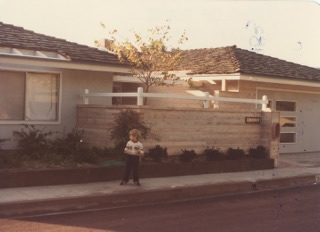 “It doesn’t take long to replace the material things,” said Frank Bower, who watched his Tahiti Street home go up in flames during the 1993 fire in the company of firefighters, crippled without an adequate water source.
“It doesn’t take long to replace the material things,” said Frank Bower, who watched his Tahiti Street home go up in flames during the 1993 fire in the company of firefighters, crippled without an adequate water source.
But rebuilding his life proved more difficult. Emotional damage can’t be swept up and carted away like the ashes of a burned foundation.
Not long afterwards, Bower recalled putting the fire into perspective in a talk at the Methodist Church. What was losing a house compared to losing a son, he asked the congregation, referring to the baby he and his wife lost in childbirth 10 years earlier.
And yet for Bower, the fire did exact a greater toll.
Materially, the Bowers moved into a better multi-level house, closer to the beach. But emotionally they never quite recaptured

the closeness of their family prior to the loss of their old home. And Bower himself suffered sleeplessness, which led to depression and letting himself go physically.
Bower, an architect, moved to Tahiti Street from Three Arch Bay with his wife and two sons because it seemed “a very special, safe place to raise my family,” he said. They called it the “two boy street” because three of the families there each had two boys. In the ensuing years, they remodeled the house four times, putting in a lot of their own sweat equity. They were finishing up the last remodel, waiting for new family room furniture to arrive when the house burned down.

The day of the fateful blaze, Bower’s wife called while he was hitting golf balls at the driving range during lunch. She told him to come home, but he saw no threat from the smoke, seemingly over by the El Toro air base. Finally, when she reiterated her plea a few hours later, he acquiesced.
Bower went home, but as the flames remained north of Canyon Road, “like a fool” he now admits, he grabbed his camera and went for a closer look. He and others watched the conflagration as the wind shifted and sent it raging up the hillside toward them.
Bower raced back to find his wife, kids and pets waiting in the car. When he got in the cat fled, never to be seen again.
After his family drove off to his parents’ home in San Juan Capistrano, Bower abandoned what he now saw as a poor plan to get on the roof with the garden hose and drove to Park Avenue where onlookers had gathered to watch the growing fire. A small car pulled up and six large guys emerged, apparently fire officials assessing the situation. Overhead, a plane let loose retardant, dousing the car with what looked like Pepto Bismol. They turned on their windshield wipers and drove off.
There was little humor elsewhere. Bower continued watching under the darkening, smoke-dense sky as the fire rained embers, trees exploded “like bombs going off,” and flames began to consume the houses above them. The guy standing next to him said, “that’s my house” and turned to leave, quipping that lack of a home would make a divorce settlement easier.
Bower remained until the homes on either side of his went up in flames, but not his.
Thinking “I may have survived this,” he drove back across fire lines to his street where he saw at least four pumper trucks, incredulously, doing nothing. The firemen said they had no more water, the little in their trucks wasn’t enough. Bower implored them to try anyway, which they did, but to no avail.
He finally drove away to join the seven lanes of traffic heading south out of town, marveling at a back seat loaded with the kids, the dog and a wide screen television.
“What do you do when everything’s gone?” asked Bower. He went out and bought everyone underwear.
In the aftermath, they moved to a rental house on the beach.
Because of a fortuitous clause in their insurance policy, Bower said they received enough money to get a better house in a better location, half a block from the beach. “In retrospect, it wasn’t very fortunate…the family changed somehow,” he said, musing that the three-story home allowed family members to isolate themselves while the one-story home kept everyone within shouting distance.
And the fire personally affected Bower in ways that had repercussions for years to come. He couldn’t sleep for six months and finally started taking Ambien, which he now believes to be the cause of a clinical depression that ensued. “The depression got me to quit taking care of myself,” he said. He ate too much, drank too much, gained 60 pounds and ended up with type 2 diabetes. Even now that he’s back in shape and has a healthy lifestyle, he still has to cope with the diabetes.
Ten years after the fire when the kids were out of high school, Bower and his wife separated. Though he doesn’t blame the fire for problems he admits were there from the start, it didn’t help. Nor did his battle with depression.
Now happily remarried and living in Los Angeles, Bower still fondly recalls the years before the fire on Tahiti Street and says his greatest regret is not going into the house while he still had the chance and grabbing the video tapes of his children when they were little. “You never think it’s going to happen to you,” he said.





[…] paper’s package of articles by multiple authors published last October, “Remembering the Firestorm,” won an honorable mention in the series […]